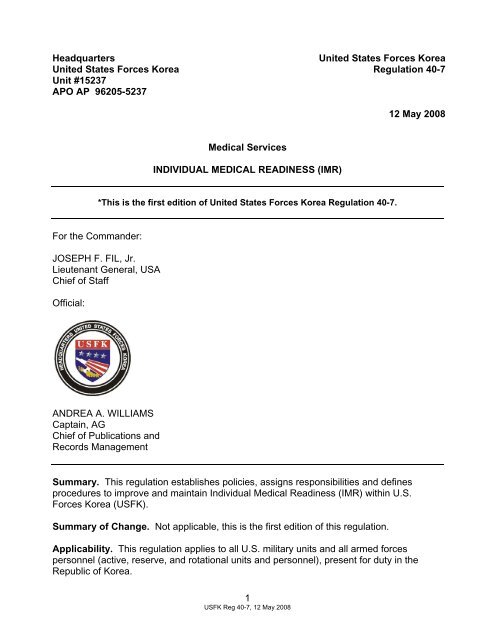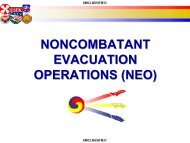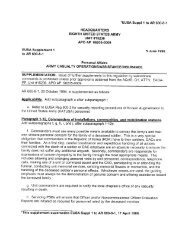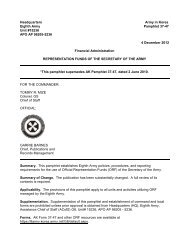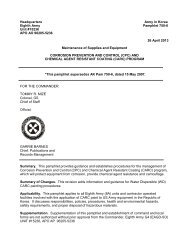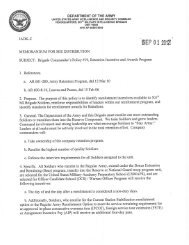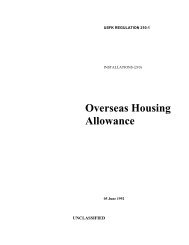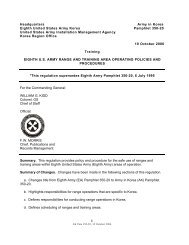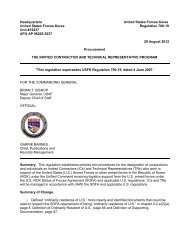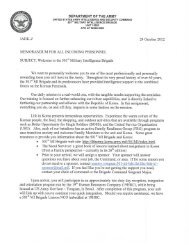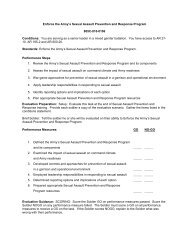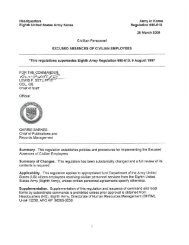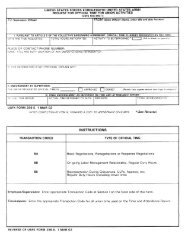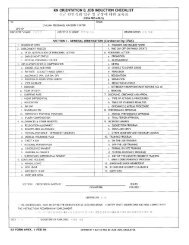USFK Reg 40-7 Individual Medical Readiness.pdf - Eighth Army ...
USFK Reg 40-7 Individual Medical Readiness.pdf - Eighth Army ...
USFK Reg 40-7 Individual Medical Readiness.pdf - Eighth Army ...
Create successful ePaper yourself
Turn your PDF publications into a flip-book with our unique Google optimized e-Paper software.
Headquarters United States Forces Korea<br />
United States Forces Korea <strong>Reg</strong>ulation <strong>40</strong>-7<br />
Unit #15237<br />
APO AP 96205-5237<br />
For the Commander:<br />
<strong>Medical</strong> Services<br />
INDIVIDUAL MEDICAL READINESS (IMR)<br />
*This is the first edition of United States Forces Korea <strong>Reg</strong>ulation <strong>40</strong>-7.<br />
JOSEPH F. FIL, Jr.<br />
Lieutenant General, USA<br />
Chief of Staff<br />
Official:<br />
ANDREA A. WILLIAMS<br />
Captain, AG<br />
Chief of Publications and<br />
Records Management<br />
Summary. This regulation establishes policies, assigns responsibilities and defines<br />
procedures to improve and maintain <strong>Individual</strong> <strong>Medical</strong> <strong>Readiness</strong> (IMR) within U.S.<br />
Forces Korea (<strong>USFK</strong>).<br />
Summary of Change. Not applicable, this is the first edition of this regulation.<br />
12 May 2008<br />
Applicability. This regulation applies to all U.S. military units and all armed forces<br />
personnel (active, reserve, and rotational units and personnel), present for duty in the<br />
Republic of Korea.<br />
1<br />
<strong>USFK</strong> <strong>Reg</strong> <strong>40</strong>-7, 12 May 2008
Supplementation. Further supplements to this regulation by subordinate commands are<br />
prohibited unless prior approval is obtained from Headquarters (HQ) <strong>USFK</strong>, (FKSG), Unit<br />
#15237, APO AP 96205-5237, email: fksg@korea.army.mil.<br />
Forms. <strong>USFK</strong> forms are available at http://www.usfk.mil.<br />
Records Management. Records created as a result of processes prescribed by this<br />
regulation must be identified, maintained, and disposed of according to governing service<br />
regulations. Record titles and descriptions are available on the <strong>Army</strong> Records Information<br />
Management System website at: https://www.arims.army.mil.<br />
Suggested Improvements. The proponent of this regulation is Office of the Command<br />
Surgeon, HQ <strong>USFK</strong> (FKSG). Users are invited to send comments and suggested<br />
improvements on DA Form 2028 (Recommended Changes to Publications and Blank<br />
Forms) to HQ <strong>USFK</strong> (FKSG), Unit #15237, APO AP 96205-5237, email:<br />
fksg@korea.army.mil.<br />
Distribution. Electronic Media Only (EMO).<br />
2<br />
<strong>USFK</strong> <strong>Reg</strong> <strong>40</strong>-7, 12 May 2008
CONTENTS<br />
SECTION I<br />
General<br />
1. Purpose<br />
2. References<br />
3. Explanation of Abbreviations and Terms<br />
4. Commander’s Intent<br />
SECTION II<br />
Responsibilities<br />
5. Service and Functional Component Commanders<br />
6. Commanding General, <strong>Eighth</strong> US <strong>Army</strong> (8 th <strong>Army</strong>)<br />
7. Commander, Seventh Air Force (7 th AF)<br />
8. Commander, Naval Forces Korea (CNFK)<br />
9. Commander, Marine Forces Korea (MARFOR-K)<br />
10. <strong>USFK</strong> Command Surgeon<br />
11. Personnel Required to Complete <strong>USFK</strong> IMR Requirements<br />
SECTION III<br />
<strong>Individual</strong> <strong>Medical</strong> <strong>Readiness</strong> Program<br />
12. <strong>USFK</strong> IMR Elements and Requirements<br />
13. <strong>USFK</strong> IMR Classification<br />
SECTION IV<br />
Policy<br />
14. Policy<br />
GLOSSARY<br />
SECTION I<br />
Acronyms<br />
SECTION II<br />
Terms<br />
3<br />
<strong>USFK</strong> <strong>Reg</strong> <strong>40</strong>-7, 12 May 2008
SECTION I<br />
General<br />
1. PURPOSE. To prescribe policies, establish responsibilities and procedures to monitor<br />
individual and unit medical readiness, and establish <strong>USFK</strong> IMR elements, requirements,<br />
and goal.<br />
2. REFERENCES.<br />
a. Required publications.<br />
(1) DoD Directive 6200.4, Force Health Protection (FHP), 23 April 2007.<br />
(2) DoD Directive 6205.02, Policy and Program for Immunizations to Protect the<br />
Health of Service Members and Military Beneficiaries, 19 September 2006.<br />
(3) DoD Instruction 6025.19, <strong>Individual</strong> <strong>Medical</strong> <strong>Readiness</strong> (IMR), 3 January 2006.<br />
(4) DoD Instruction 6200.05, Force Health Protection (FHP) Quality Assurance<br />
(QA) Program, 16 February 2007.<br />
(5) US Forces Korea (<strong>USFK</strong>) Command Policy Letter #37, <strong>Individual</strong> <strong>Medical</strong><br />
<strong>Readiness</strong> (IMR), 16 July 2007.<br />
b. Related publications:<br />
(1) Assistant Secretary of Defense (Health Affairs) Policy Memorandum 03-009,<br />
Policy for <strong>Individual</strong> <strong>Medical</strong> <strong>Readiness</strong> Metrics, 2 May 2003.<br />
(2) Assistant Secretary of Defense (Health Affairs) Policy Memorandum 06-006,<br />
Periodic Health Assessment Policy for Active Duty and Selected Reserve Members, 16<br />
February 2006.<br />
(3) Chairman, Joint Chiefs of Staff Memorandum, Updated Procedures for<br />
Deployment Health Surveillance and <strong>Readiness</strong>, 1 February 2002.<br />
3. EXPLANATION OF ABBREVIATIONS AND TERMS. Abbreviations and terms used in<br />
this regulation are explained in the glossary.<br />
4. COMMANDER’S INTENT. To establish defined, measurable medical elements,<br />
standards, and goals for medical readiness within <strong>USFK</strong> to enable commanders and<br />
higher headquarters the ability to continuously monitor assigned military personnel for<br />
medical readiness and deployability.<br />
4<br />
<strong>USFK</strong> <strong>Reg</strong> <strong>40</strong>-7, 12 May 2008
SECTION II<br />
Responsibilities<br />
5. SERVICE AND FUNCTIONAL COMPONENT COMMANDERS. The <strong>USFK</strong> IMR<br />
Program is a commander’s program that will improve the medical readiness of service<br />
members. Service and Functional Component Commanders will support and give<br />
Command emphasis to the <strong>USFK</strong> IMR Program by accomplishing the following:<br />
a. Publishing and enforcing procedures and guidance to ensure all personnel assigned<br />
or attached to their command understand and comply with this <strong>Reg</strong>ulation and <strong>USFK</strong><br />
Command Policy Letter #37, <strong>Individual</strong> <strong>Medical</strong> <strong>Readiness</strong> (IMR).<br />
b. Utilizing the IMR Program to monitor, track and report individual and unit medical<br />
readiness.<br />
c. Establishing a command expectation that subordinate commanders and individuals<br />
will be responsible for meeting and maintaining IMR requirements.<br />
d. Ensuring unit commanders establish procedures for designated unit personnel to<br />
monitor IMR status at least monthly using established IMR systems and reports.<br />
e. Ensuring appropriate action is taken regarding units and individuals with excessive<br />
IMR delinquencies.<br />
f. Ensuring subordinate commanders and leaders work closely with their supporting<br />
medical treatment facilities to obtain and maintain a high level of medical readiness.<br />
g. Ensuring subordinate units designate primary unit IMR Program Managers and<br />
prescribe the necessary resources and authority to enable them to effectively manage unit<br />
IMR status.<br />
h. Ensuring Permanent Change of Station (PCS) reporting instructions require all<br />
inbound personnel to meet all <strong>USFK</strong> IMR requirements prior to reporting to Korea.<br />
i. Ensuring new <strong>USFK</strong> service members arriving on the Korean peninsula complete an<br />
IMR element screening during in-processing.<br />
j. Assuring unit readiness posture meets and maintains the <strong>USFK</strong> goal of 80 percent or<br />
better Fully <strong>Medical</strong>ly Ready (FMR) status established by this regulation.<br />
k. Implementing procedures to ensure IMR information is reported into the Status of<br />
Resources and Training System (SORTS)/Defense <strong>Readiness</strong> Reporting System (DRRS)<br />
to facilitate readiness and deployability assessments.<br />
l. Issuing directives to implement guidance on IMR.<br />
6. COMMANDING GENERAL, EIGHTH US ARMY (8 TH ARMY) will ensure the 18 th<br />
<strong>Medical</strong> Command (MEDCOM):<br />
5<br />
<strong>USFK</strong> <strong>Reg</strong> <strong>40</strong>-7, 12 May 2008
a. Maintains adequate medical capabilities that meet TRICARE access standards and<br />
provides services to allow service members who report on-time to meet their IMR<br />
requirements.<br />
b. Establishes procedures to guarantee data entry into the IMR electronic tracking<br />
system on IMR-related services rendered to service members.<br />
c. Coordinates with unit commanders or their designated unit IMR Program Manager<br />
to maximize the number of unit personnel classified as FMR.<br />
d. Provides IMR electronic tracking system training on IMR data entry, data<br />
maintenance, and the tracking and monitoring of unit status, to unit commanders, their<br />
designated unit IMR Program Manager and data entry personnel.<br />
e. Provides feedback on unit IMR status to supported commands as appropriate.<br />
7. COMMANDER, SEVENTH AIR FORCE (7 TH AF) will ensure the 51 st and 8 th <strong>Medical</strong><br />
Groups:<br />
a. Maintain adequate medical capabilities that meet TRICARE access standards and<br />
provide services to allow service members who report on-time to meet their IMR<br />
requirements.<br />
b. Establish procedures to guarantee data entry into the IMR electronic tracking<br />
system on IMR-related services rendered to service members.<br />
c. Coordinate with unit commanders or their designated unit IMR Program Manager to<br />
maximize the number of unit personnel classified as FMR.<br />
d. Monitor IMR status and report IMR requirements that are due or overdue to the<br />
appropriate unit commanders or their designated unit IMR Program Manager at least<br />
monthly.<br />
e. Track and report to unit commanders the names of their individual unit service<br />
members who fail to take action to meet IMR requirements after notifications to the<br />
member and unit.<br />
f. Ensure the provision of training necessary to maintain and operate the IMR<br />
electronic tracking system.<br />
8. COMMANDER, NAVAL FORCES KOREA (CNFK) will:<br />
a. Provide medical support to and IMR tracking for Commander, Marine Forces Korea<br />
(MARFOR-K).<br />
b. Coordinate with Naval Hospital Yokosuka, Japan to ensure Branch <strong>Medical</strong> Clinic<br />
Chinhae:<br />
6<br />
<strong>USFK</strong> <strong>Reg</strong> <strong>40</strong>-7, 12 May 2008
(1) Provides medical support and IMR tracking for Navy and Marine Corps<br />
personnel assigned to Fleet Activities Chinhae and Camp Mujuk.<br />
(2) Maintains adequate medical capabilities that meet TRICARE access standards<br />
and provides services to allow assigned Navy and Marine Corps personnel who report ontime<br />
to meet their IMR requirements.<br />
(3) Establishes procedures to guarantee data entry into the IMR electronic tracking<br />
system on IMR-related services rendered.<br />
(4) Monitors IMR status and reports IMR requirements that are due or overdue to<br />
the appropriate unit(s) or their designated unit IMR Program Manager at least monthly.<br />
(5) Tracks and reports to CNFK and MARFOR-K the names of Sailors and Marines<br />
who fail to take action to meet IMR requirements after notifications to the member and the<br />
member’s unit.<br />
(6) Coordinates with unit commanders or their designated unit IMR Program<br />
Manager to maximize the number of unit personnel classified as FMR.<br />
c. Ensure the provision of training necessary to maintain and operate the IMR<br />
electronic tracking system.<br />
9. COMMANDER, MARINE FORCES KOREA (MARFOR-K) will coordinate with CNFK<br />
for medical support and IMR tracking.<br />
10. <strong>USFK</strong> COMMAND SURGEON will:<br />
a. Serve as proponent for <strong>USFK</strong> IMR policy and procedures, evaluate the program’s<br />
effectiveness, recommend changes and/or revisions to policy as necessary, and maintain<br />
program oversight.<br />
b. Monitor IMR medical support capabilities and services, and work with Service<br />
Component Command Surgeons to correct discrepancies as appropriate.<br />
c. Monitor and track IMR status via the Service specific IMR electronic tracking<br />
systems.<br />
11. PERSONNEL REQUIRED TO COMPLETE <strong>USFK</strong> IMR REQUIREMENTS. All U.S.<br />
military personnel performing duties within the Republic of Korea must complete all IMR<br />
requirements and maintain a high level of medical readiness and deployability at all times<br />
as prescribed in DoD guidance and this regulation.<br />
7<br />
<strong>USFK</strong> <strong>Reg</strong> <strong>40</strong>-7, 12 May 2008
SECTION III<br />
<strong>Individual</strong> <strong>Medical</strong> <strong>Readiness</strong> Program<br />
12. <strong>USFK</strong> IMR ELEMENTS AND REQUIREMENTS. The Department of Defense has<br />
established requirements for tracking IMR. The six IMR elements as defined by DoD<br />
Instruction 6025.19, <strong>Individual</strong> <strong>Medical</strong> <strong>Readiness</strong> (IMR) and the established <strong>USFK</strong> IMR<br />
requirements are:<br />
a. Periodic Health Assessment (PHA) – An annual PHA is required for all <strong>USFK</strong><br />
service members to monitor their health status and provide timely preventive healthcare,<br />
counseling, treatment, or testing, as appropriate. New <strong>USFK</strong> service members arriving on<br />
the Korean peninsula will be screened during in-processing for PHA compliance, and<br />
scheduled to complete their PHA, as required. Furthermore, the PHA will be performed<br />
within 30 days of each service member’s birth month, when feasible, but no later than 60<br />
days following the due month. Completion of the PHA will be documented in the service<br />
specific IMR electronic tracking system.<br />
b. Dental <strong>Readiness</strong> – All service members are required to maintain a Dental Fitness<br />
Category 1 or 2 status with no major dental work required, and will have a panographic<br />
dental x-ray on file. An annual dental examination is required and will be synchronized<br />
and documented with the annual PHA, when feasible.<br />
c. <strong>Medical</strong> <strong>Readiness</strong> Laboratory Studies – The basic laboratory studies required for<br />
all <strong>USFK</strong> service members in Korea are blood type and Rh (Rhesus) factor, Glucose-6-<br />
Phosphate Dehydrogenase (G6PD) status (normal or abnormal), Deoxyribonucleic Acid<br />
(DNA) specimen (verified as received and acceptable by the Armed Forces Institute of<br />
Pathology repository), and Human Immunodeficiency Virus (HIV) antibody status (as<br />
tested and documented by the receiving DoD lab). The HIV antibody testing will be<br />
repeated every two years or in accordance with Service-specific requirements, and<br />
synchronized as part of the annual PHA. Service-specific policies may identify additional<br />
readiness laboratory test.<br />
d. Immunization Status – All <strong>USFK</strong> service members are required to maintain the<br />
following essential immunizations for Korea in order to be medically ready (or they must<br />
have the appropriate medical and/or administration exemption from specific immunizations<br />
documented in their health record): Inactivated Polio Vaccine (IPV); Tetanus, Diphtheria<br />
and acellular Pertussis (Td/Tdap); Measles, Mumps and Rubella (MMR); Hepatitis A and<br />
Hepatitis B (complete series); Typhoid; Anthrax (shot current in accordance with dosing<br />
series); Smallpox; annual Influenza; and Purified Protein Derivative (PPD) Tuberculosis<br />
skin test. The PPD Tuberculosis skin testing will be repeated annually or in accordance<br />
with Service-specific requirements, and synchronized as part of the annual PHA.<br />
Vaccinations are overdue 30 days after their due date. All immunizations will be<br />
electronically reported to the Defense Eligibility Enrollment System (DEERS) via the<br />
Service-specific IMR electronic tracking system.<br />
e. <strong>Individual</strong> <strong>Medical</strong> Equipment – Service members who require corrective lenses<br />
will possess gas mask inserts for the model of gas mask and/or ballistic eyewear issued.<br />
8<br />
<strong>USFK</strong> <strong>Reg</strong> <strong>40</strong>-7, 12 May 2008
Similarly, Service members who require other personal medical equipment (e.g. hearing<br />
aids), will have that equipment. Furthermore, medical warning tags are required for<br />
individuals with documented allergies and permanent conditions that would delay medical<br />
treatment in the absence of a medical record, or render the routinely indicated course of<br />
treatment inappropriate (e.g. diabetes, allergic reaction and hypersensitivity to certain<br />
drugs, or insect bites). Service-specific policies may identify additional items of medical<br />
equipment.<br />
f. No Deployment Limiting Conditions – To be considered medically ready, service<br />
members should be free of any deployment limiting conditions.<br />
13. <strong>USFK</strong> IMR CLASSIFICATION. Commanders, the military healthcare system, and the<br />
individual service member share responsibility for IMR. The tracking of IMR benefits<br />
service members and units by ensuring each member of the <strong>USFK</strong> team is protected<br />
against infections and endemic diseases, can safely receive chemoprophylaxis<br />
(medications to prevent diseases) and treatments, has the required medical equipment,<br />
and possesses an appropriate state of dental readiness. Within <strong>USFK</strong>, the medical<br />
readiness of each service member is classified as follows:<br />
a. Green-Fully <strong>Medical</strong>ly Ready (FMR): Service members are current in all six<br />
elements.<br />
b. Yellow (Amber)-Partially <strong>Medical</strong>ly Ready (PMR): Service members are lacking any<br />
readiness immunizations, laboratory studies, or medical equipment, and have a published<br />
Dental Class 3 treatment plan with no delays nor missed appointments.<br />
c. Red-Not <strong>Medical</strong>ly Ready (NMR): Service members are in a Dental Class 3 status<br />
or possess a chronic or prolonged deployment limiting condition.<br />
d. <strong>Medical</strong> <strong>Readiness</strong> Indeterminate (MRI): Inability to determine the medical<br />
readiness status because of a missing health record, overdue PHA, or Dental Category 4<br />
status.<br />
SECTION IV<br />
Policy<br />
14. POLICY.<br />
a. IMR assessment is a continuous process that will be monitored and reported on<br />
frequently and at least monthly, to provide leaders the ability to ensure a healthy and fit<br />
force, and evaluate the readiness of <strong>USFK</strong> service members to participate in the full range<br />
of military activities and operations.<br />
b. Commanders and leaders at all levels will emphasize the importance of improving<br />
and maintaining medical readiness, and will use the <strong>USFK</strong> IMR program to monitor<br />
individual and unit medical readiness.<br />
9<br />
<strong>USFK</strong> <strong>Reg</strong> <strong>40</strong>-7, 12 May 2008
c. All <strong>USFK</strong> military units will obtain and maintain 80 percent or better FMR status as<br />
documented in the Service specific IMR electronic tracking system.<br />
d. Commanders and leaders will ensure IMR requirements are entered and reported in<br />
the Service specific IMR electronic tracking system, and SORTS/DRRS to facilitate<br />
readiness and deployability assessments.<br />
e. The PHA will be used to appraise, validate, and rectify IMR deficiencies; and<br />
substantiate compliance with various elements of deployment health to include: predeployment<br />
health assessments, post-deployment health assessments, and the postdeployment<br />
health reassessment.<br />
10<br />
<strong>USFK</strong> <strong>Reg</strong> <strong>40</strong>-7, 12 May 2008
Glossary<br />
Section I<br />
Acronyms<br />
7 th AF Seventh Air Force<br />
8 th <strong>Army</strong> <strong>Eighth</strong> US <strong>Army</strong><br />
18 th MEDCOM 18 th <strong>Medical</strong> Command<br />
CNFK Commander, Naval Forces Korea<br />
DEERS Defense Eligibility Enrollment System<br />
DoD Department of Defense<br />
DNA Deoxyribonucleic Acid<br />
DRRS Defense <strong>Readiness</strong> Reporting System<br />
FHP Force Health Protection<br />
FKSG Office of the Command Surgeon, <strong>USFK</strong><br />
FMR Fully <strong>Medical</strong>ly Ready<br />
G6PD Glucose-6-Phosphate Dehydrogenase<br />
HIV Human Immunodeficiency Virus<br />
HQ Headquarters<br />
IMR <strong>Individual</strong> <strong>Medical</strong> <strong>Readiness</strong><br />
IPV Inactivated Polio Vaccine<br />
MARFOR-K US Marine Forces Korea<br />
MEDCOM <strong>Medical</strong> Command<br />
MMR Measles, Mumps and Rubella<br />
MRI <strong>Medical</strong> <strong>Readiness</strong> Indeterminate<br />
PCS Permanent Change of Station<br />
PHA Periodic Health Assessment<br />
11<br />
<strong>USFK</strong> <strong>Reg</strong> <strong>40</strong>-7, 12 May 2008
PMR Partially <strong>Medical</strong>ly Ready<br />
PPD Purified Protein Derivative<br />
Rh Rhesus<br />
SORTS Status Of Resources and Training System<br />
Td/Tdap Tetanus, Diphtheria, and acellular Pertussis<br />
U.S. United States<br />
<strong>USFK</strong> United States Forces, Korea<br />
12<br />
<strong>USFK</strong> <strong>Reg</strong> <strong>40</strong>-7, 12 May 2008
Section II<br />
Terms<br />
Chemoprophylaxis. The administration of a chemical agent to prevent the development<br />
of diseases.<br />
Dental <strong>Readiness</strong>. A service member’s dental health as it relates to their preparedness to<br />
participate in the full range of military activities, operations and world-wide deployments.<br />
Force Health Protection (FHP). For purposes of this regulation, it includes all measures<br />
taken by commanders, supervisors, individual service members, and the military health<br />
system to promote, protect, improve, conserve, and restore the mental and physical wellbeing<br />
of service members across the full range of military activities and operations. These<br />
measures enable the fielding of a healthy and fit force, the prevention of injuries and<br />
illness, and protection of the force from health threats; and the provision of highly effective<br />
medical and rehabilitative care to those who become sick or injured.<br />
Glucose-6-Phosphate Dehydrogenase (G6PD). An X-linked (related to the<br />
chromosomal gender of the individual) recessive hereditary disease featuring abnormally<br />
low levels of the G6PD enzyme, which plays an important role in red blood cell function.<br />
<strong>Individual</strong>s with the disease may exhibit non-immune hemolytic anemia (break down of red<br />
blood cells) in response to a number of causes.<br />
Immunization. The process of rendering an individual immune to specific diseasecausing<br />
agents. Immunization most frequently refers to the administration of a vaccine to<br />
stimulate the immune system to produce an immune response.<br />
<strong>Individual</strong> <strong>Medical</strong> <strong>Readiness</strong> (IMR). The extent to which a service member is medically<br />
ready to participate in the full range of military activities and operations—to include<br />
operational deployments, as measured by six key elements: a current periodic health<br />
assessment; the absence of deployment-limiting health conditions; a favorable dental<br />
readiness classification; currency in required immunizations; the completion of readinessrelated<br />
laboratory studies; and the availability of individual medical equipment.<br />
Periodic Health Assessment (PHA). An annual assessment for changes in health<br />
status, especially those that could impact a member’s ability to perform military duties.<br />
Rhesus Factor (Rh Factor). A classification factor to describe blood types in humans.<br />
Vaccination. The administration of a vaccine to an individual for inducing immunity.<br />
Vaccine. A preparation that contains one or more components that when administered,<br />
induces a protective immune response against a pathogen (infectious agent).<br />
13<br />
<strong>USFK</strong> <strong>Reg</strong> <strong>40</strong>-7, 12 May 2008


